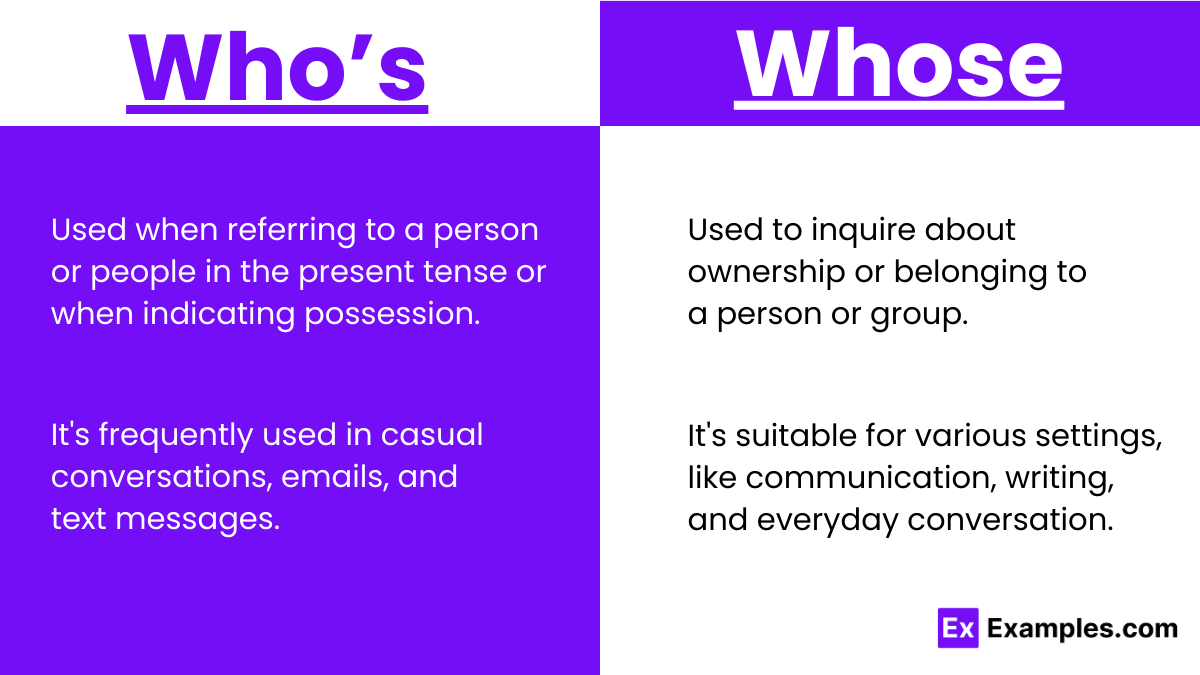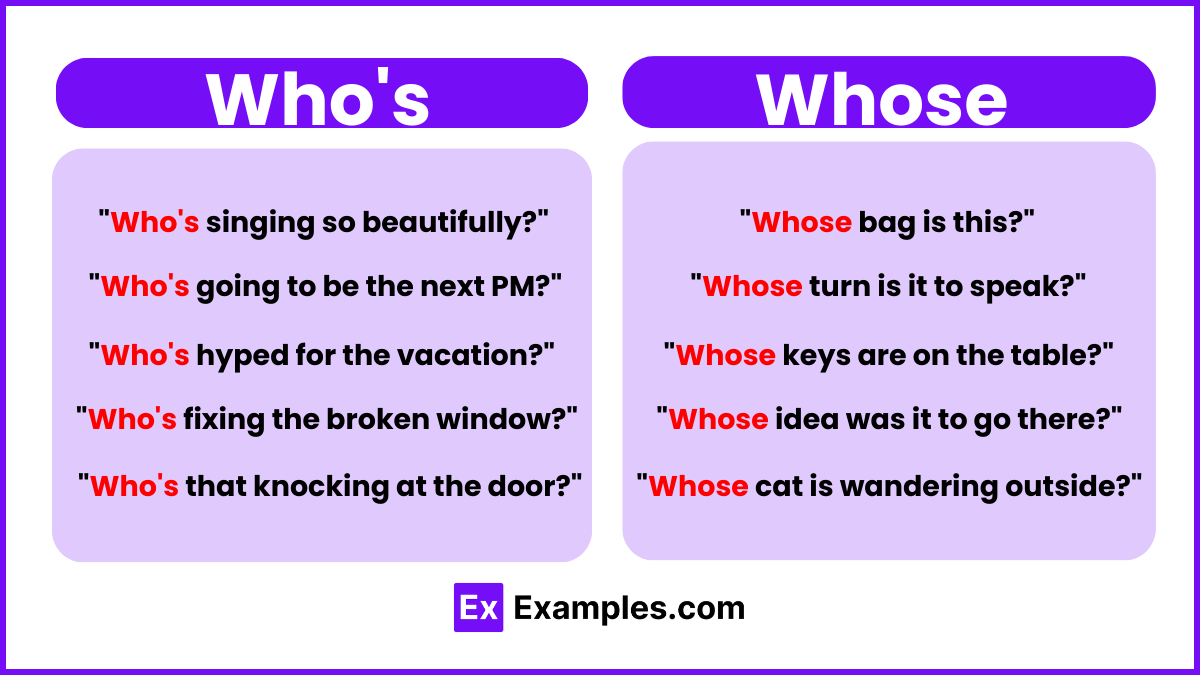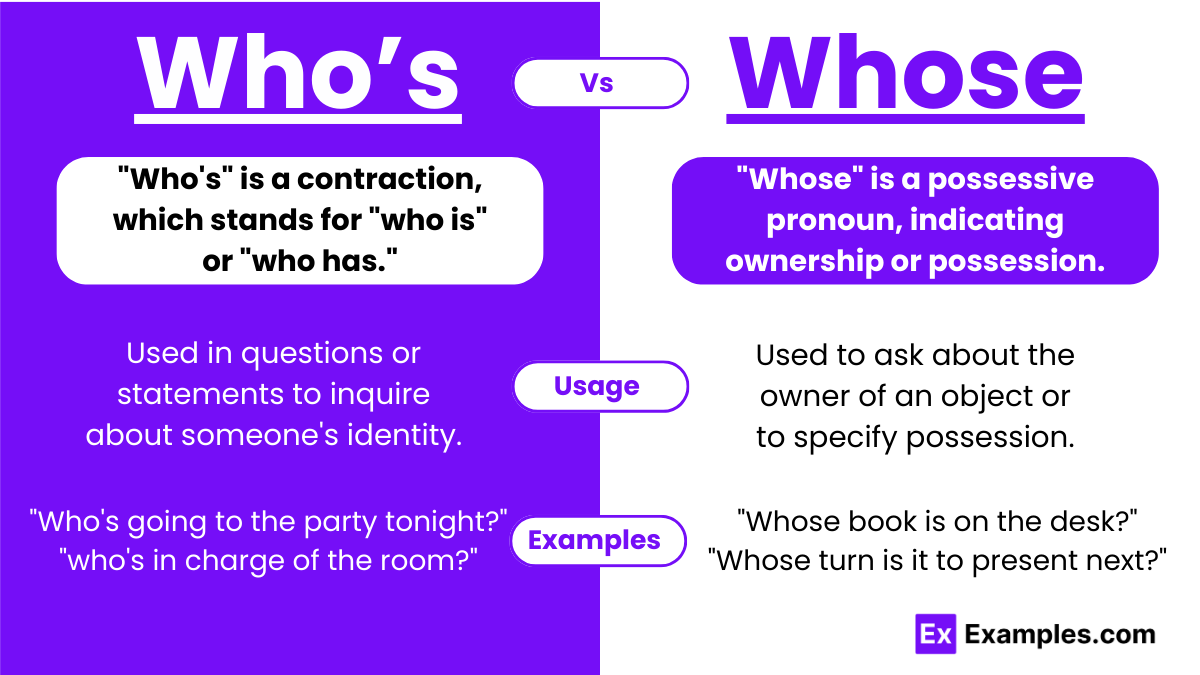Who’s vs Whose – Meanings, Differences, Usage, Examples
Understanding the differences of “Who’s” and “Whose” can be tricky, but it’s essential. “Who’s” is a contraction, like when we say “who’s there?” It’s short for “who is” or “who has.” On the other hand, “Whose” indicates possession, like asking “whose shoes are these?” Even though they sound alike, they serve different purposes in a sentence. So, remember, “who’s” is a contraction, and “whose” shows possession.
Who’s vs Whose – Meanings
- Who’s: It is a contraction, which means it combines two words into one by replacing one or more letters with an apostrophe. It is a contraction of either “who is” or “who has.”
- Whose: It is a pronoun that indicates possession or association. It’s used to ask about the owner or the person something relates to. It’s used when you want to find out who something belongs to or who it is associated with.
Summary
How to Pronounce Who’s and Whose
- Who’s: Pronounced as /huːz/.
- Whose: Pronounced as /huːz/.
Differences Between Who’s and Whose
| Aspect | Who’s | Whose |
|---|---|---|
| Contraction | Contraction of “who is” or “who has” | Does not function as a contraction |
| Possession | Does not denote possession | Denotes possession |
| Grammatical | Functions as a subject or object | Functions as a possessive pronoun |
| Clarity | Sometimes ambiguous without context | Indicates clear possession |
| Syntax | Used before a verb or noun | Typically followed by a noun or noun phrase |
How To Remember The Differences Between Who’s and Whose
- Who’s: Think of the address “who’s” as standing in place of the missing letters in “who is” or “who has.”
- Whose: Remember that “whose” is used to show possession, similar to “his” or “her.” It indicates ownership by someone.
When To Use Who’s and Whose

Usage of Who’s
- Contraction for “Who is”:
- “Who’s” is a contraction of “who is.”
- It’s used in questions or statements to inquire about someone’s identity, actions, or plans.
- Contraction for “Who has”:
- “Who’s” can also be a contraction of “who has.”
- It’s used to ask about possession or knowledge of something.
- Informal Contexts:
- “Who’s” is commonly used in informal speech and writing.
- Example: “Who’s coming with us?” (meaning “Who is coming with us?”)
- It’s frequently used in casual conversations, emails, and text messages.
Usage of Whose
- Indicates Possession:
- “Whose” is used to indicate possession or ownership
- It’s used to ask about the owner of an object or to specify possession.
- Ownership Inquiry:
- When you want to know to whom something belongs, you use “whose.”
- Example: “Whose jacket is this on the chair?” (meaning “To whom does this jacket belong that is on the chair?”)
- It helps clarify ownership or possession in a given situation.
- Formal and Informal Usage:
- “Whose” is used in both formal and informal contexts.
- Example: “Whose idea was it to start the project?” (formal)
- Example: “Whose turn is it to clean the dishes?” (informal)
- It’s suitable for various settings, including professional communication, academic writing, and everyday conversation.
Who’s vs Whose – Examples

Who’s Examples
- “Who’s going to the party tonight?”
- “Do you know who’s in charge of the project?”
- “Who’s been using my laptop without permission?”
- “I wonder who’s going to win the game tomorrow.”
- “Who’s responsible for cleaning up the mess in the kitchen?”
Whose Examples
- “Whose book is on the desk?”
- “Whose car is parked in front of the house?”
- “Do you know whose dog is barking incessantly?”
- “Whose turn is it to present next?”
- “I found a wallet on the street. Whose could it be?”
Exercises
Exercise
- __________ going to clean up the mess in the kitchen?
- __________ jacket is this on the chair?
- __________ keys are on the table?
- __________ been using my computer without permission?
- __________ responsibility is it to fix the broken window?
Answers
- Who’s
- Whose
- Whose
- Who’s
- Whose
FAQ’S
How is Whose Used in a Sentence?
“Whose” indicates ownership or possession by a person before a noun. Example: “Whose book is this?”
Is “Whose This” Grammatically Correct?
No, “whose this” is not grammatically correct. “Whose” is a possessive pronoun used before a noun to indicate ownership. Example: “Whose book is this?”
Is it Who’s Fault or Whose Fault?
It is “whose fault.” “Whose” is possessive, indicating ownership. “Who’s” is a contraction of “who is” or “who has.” Example: “Whose fault is it?”
Is it Whose or Who’s Birthday?
It is “whose birthday.” “Whose” indicates possession, while “who’s” is a contraction meaning “who is” or “who has.” Example: “Whose birthday is it?”


